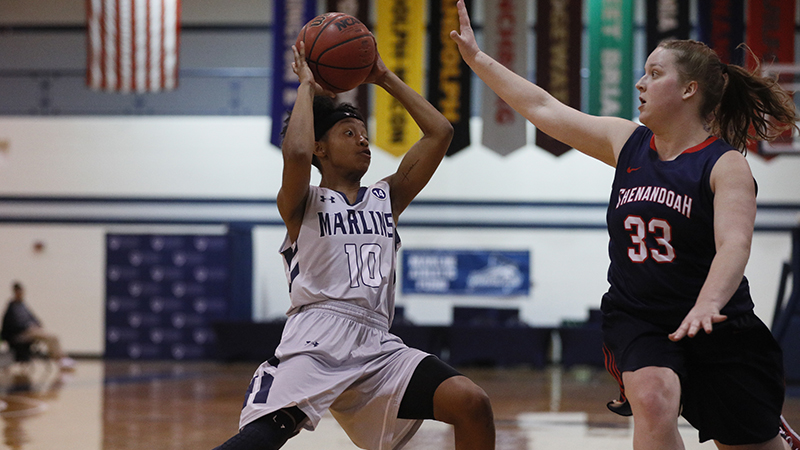Hailey Benders|Marlin Chronicle
Athletes work tirelessly daily to perform at their best. Some have mastered the necessary techniques to prove they are the best. Nothing demonstrates being the best more than holding a record. The process of attaining a record surpasses merely working hard. Record-breaking athletes first-year Natasha Tate and sophomore Cael Long discuss what it takes to break a record.
As a first-year, Tate, a member of the Women’s Track and Field team, has already broken three records: the 200 M, 60 M and 4×100 relay.
Tate’s road to success is unconventional, as she broke her first collegiate record in her first track meet after not running since her junior year of high school.
“I always knew that I was fast, and I always knew that people were counting on me to do certain things or live up to, like track and my speed. So it wasn’t easy because, trust me, I didn’t run in a year and some change coming out of my high school, so it’s like I take our workouts more seriously,” Tate said.
With this change in sincerity, Tate emphasized the importance of technical focus when practicing.
“I’d say what makes me different from other runners, I don’t just run, I pay attention. I’m more like a visual learner, so when my coach is explaining something, most of the time I’ll mock him doing what he’s doing. I don’t just stand there and say I understand something when I don’t understand,” Tate said.
After mastering these techniques with the guidance of her coaches, Tate mentioned how integral mental clarity is in the application of what is practiced in races.
“When I’m on the line, I clear my head, and I apply what we learned that practice mechanically,” she said. “When I’m on the start of the line, I think of like the med ball throws where we throw it out, so I jump out my blocks. Then as I’m running, I have a rhythm in my head.”
Long, a member of the men’s swimming team who holds eight records, also pointed out the importance of mastering technique and clearing the mind to visualize said techniques in races.
“Swimming requires a lot of technique, and my coaches have worked hard to get me to maintain good technique even when I am tired,” Long said. “Prior to my race, I like to close my eyes, take several deep breaths in and out, and focus on what I am about to do in the water. I visualize myself like I am one with the water, so that when I dive in, the water works with me to achieve a fast swim.”
Support from teammates, from cheering them on to picking them up when they are down, is also something that Tate feels is important in her success.
“We’ll cheer each other on; we help each other get out of each other’s heads. Even if it’s a bad race, we try to point out the positive stuff in the race and things of that sort,” she said.
One thing that may not be necessary in the road to breaking a record is having access to a program with immense resources, such as access to the best sports equipment. According to Tate, knowing her body is more important than running for a well-funded program.
“We have the equipment that we need, but money doesn’t change but different uniforms. A uniform is not going to change how I run,” she said. “If I was to go to a different school, I’m going to still run to my limit.”
Long also emphasized the importance of understanding his body rather than having access to extra resources.
“Resources can be more of a luxury and speak to status more than actual results in the pool. You need to understand how your body works in terms of training, mental focus and performance to succeed,” he said.
From a coaching perspective, Kristian Ramkvist, the Director of the Men’s and Women’s Swimming team, commented on what it takes to break a record.
Breaking multiple records himself during his collegiate career, Ramkvist is not a stranger to what it takes to get to that point, including years of hard work and dedication.
“I would say that most of [VWU Swimming’s record holders] have a background in club swimming, which makes a big difference because club swimming is like 11 months out of the year, so, you know, you’re training, training, training from a pretty young age and that will an effect later on in college too,” he said.
Ramkvist also noted the importance of rest in order to perform at one’s best when it counts.
“In my world [recovery] is everything because to perform and be powerful, I do think you got to be a little bit rested,” he said.
Although Ramkvist agreed with Tate and Long on the luxury but not necessity of extra resources, Ramkvist did note that the more coaches his team could have, the better.
“The more coaches you can have on a pool deck, the better it would be obviously, there’s no doubt about that. On our race days, we might do four to five different workouts at the same time, and it’s just me and another assistant coach… might give us less time per swimmer,” Ramkvist said.
With the input of VWU record holders, it is clear that the path to breaking a record is complex. The work ethic of these athletes put them into a position set for success, but what truly propelled them to success was mental toughness, support from their coaches and teammates and, most importantly, rest. These aspects are more impactful than any expensive, extravagant machine that promises record-breaking success.
By: Sydnee Washington
sawashignton@vwu.edu


